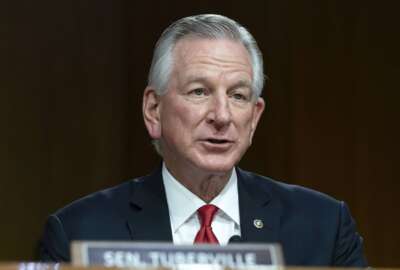Sen. Tommy Tuberville’s (R-Ala.) hold on Senate-confirmed Defense Department nominations will likely not end before Congress’ August recess. It’s a move that leaves not just nominees, but military and civilian DoD families in a state of limbo. The trickle-down effect means a hold on plans for family moves, school admittances and spouse employment.
Secure Families Initiative (SFI), a military family advocacy group, sent a petition to Tuberville and Senate leadership on Monday requesting the block be lifted. Members of the group delivered the petition with more than 550 signatures to the offices of Tuberville, as well as Majority Leader Chuck Schumer (D-N.Y.) and Minority Leader Mitch McConnell (R-Ky.).
“This issue affects every single one of us with a loved one in uniform because it’s politicizing an institution that we rely on for our safety. If we’re going to trust that our Senators are going to have our back and do what’s right, over more consequential decisions, over life and death, we’re not given a lot of confidence that can work when something that should be basic and nonpartisan can’t even go through,” Sarah Streyder, executive director of SFI told Federal News Network.
In a battle of dueling letters, a group of 5,000 conservative veterans and members of Congress wrote a letter to Schumer and McConnell supporting Tuberville’s confirmation block.
“The undersigned stand united in condemning this policy,” wrote the veterans. “This policy is not just illegal, it shamefully politicizes the military, circumvents the authority of Congress, and exceeds the authority of the Department of Defense.”
The block is a protest against a Pentagon rule that allows military members paid leave and travel expenses for reproductive health care if it is not available in the area where they are stationed. Streyder called the veterans’ letter an oversimplification of an issue that was meant to address reproductive health care as a whole.
“This isn’t a pro-life or pro-choice debate. The DoD policy is a travel and leave policy out of recognition of the fact that service members don’t get to choose where they live. And DoD is trying to make sure that folks either in uniform who need it or their immediate dependents can still access reproductive health care,” Streyder said.
Tuberville and his supporters maintain the travel allowances support service members who get abortions. He told The Hill that he has no plans to change his mind about the block before the recess.
Streyder said her group’s petition was non-partisan and meant to express support for the military families affected by the block.
“As a family member of someone who’s actively still in uniform, what I’m talking about is our day-to-day present and our day-to-day future. And I think that is an important stake in this situation that’s a bit distinct from our veteran colleagues. And so that’s why we felt it was important to inject military family voices into the conversation,” Streyder said.
Although the block only affects DoD military and civilian leadership nominated for a post that requires Senate confirmation, the hold-up means service members and Pentagon employees further down the chain of command face delays in moving to new jobs and uncertainty about where and when their next move will be. It affects families as they plan for enrolling children in school and spouses as they decide whether to quit their current jobs and look for new ones in anticipation of a move.
“There around 281 military families stuck in limbo right now, until their service member’s promotion clears, they’re having to make impossible choices about whether or not to move ahead of time and hope that they get reimbursed for out-of-pocket expenses, or whether to stay and wait and delay a spouse’s ability to find the next job or their kids’ ability to plug-in with the next school,” Streyder said. “They’re obviously the folks most negatively impacted, then there’s that second level of folks who are stuck in their jobs because there’s no backfill left, or they’re unable to advance to the next job because someone’s still taking up space.”
Moving forward, Streyder said SFI wants to see Senate use legislative means to resolve the dispute over the healthcare travel rules and end the block on promotions. The petition calls for Senate to “work together to resolve political and ideological disagreements outside the military space,” and “expeditiously confirm all blocked promotions and fill existing vacancies.”
Tuberville’s hold on nominations could overcome if the Senate were to vote individually on the nominations, a process that could take months. Military leaders have said the block not only hurts military families, but also hurts recruiting and retention. They predict the number of unconfirmed positions will pass 600 by the end of the year.
“In addition to the senior officers, there’s a whole chain of events that goes down to our more junior officers. It has an impact — it has an impact on their progression in their career field, potentially because if one doesn’t get promoted or move on, then they’re blocking a spot for someone else,” said Air Force General C.Q. Brown at his July 11 Senate nominating hearing to be the next Chairman of the Joint Chiefs of Staff.
Brown, in addition to nominees for chiefs of staff for the service branches, currently have acting chiefs because of the hold on nominations.
Copyright
© 2024 Federal News Network. All rights reserved. This website is not intended for users located within the European Economic Area.






